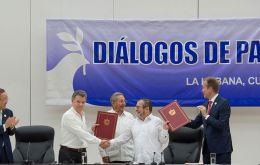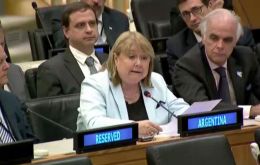MercoPress. South Atlantic News Agency
Stories for June 24th 2016
-
Friday, June 24th 2016 - 08:07 UTC
Vote Leave Chief and ex London mayor expected to go for PM Cameron post

When Boris Johnson announced in February that he would back the UK campaign to Leave the European Union, it transformed the debate. Johnson is popular with the public and within his party. By becoming the official head of Vote Leave, he gave the weight of the establishment to a campaign previously spear-headed by fringe political figures such as Nigel Farage and George Galloway.
-
Friday, June 24th 2016 - 07:43 UTC
“Leave” win tremors: sterling falls; Bank of England on full alert; “EUexit” domino calls

The UK has voted on Thursday, 23 June, to leave the European Union after 43 years in a historic referendum. Leave won by 51,9% to 48,1% with England and Wales voting strongly for Brexit, while London, Scotland and Northern Ireland backed staying in the EU.
-
Friday, June 24th 2016 - 04:12 UTC
Colombia signs historic cease fire to end half a century armed conflict

An agreement aimed at ending more than five decades of conflict between the Colombian government and the FARC guerrilla group was signed in Havana on Thursday at a ceremony presided over by Cuban head of state Raul Castro.
-
Friday, June 24th 2016 - 04:00 UTC
Falklands are not recognized as a “people” and the principle of self determination does not apply, argues Malcorra

With a less aggressive tone but with the same determination, Argentine foreign minister Susana Malcorra (and hopeful UN Secretary General), argued that the principle of self-determination is not absolute and does not apply to the disputed Falkland/Malvinas Islands, since the principle of territorial integrity of States prevails, and the inhabitants of the Malvinas are not recognized as a “people”.
